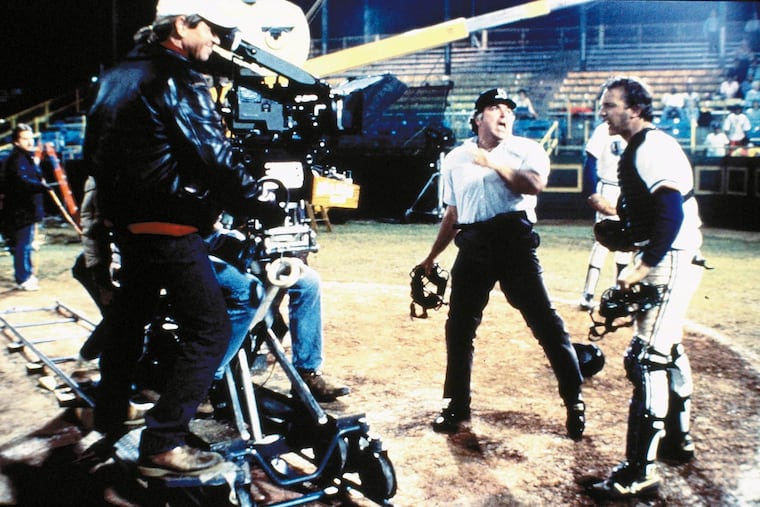The man behind ‘Bull Durham’ wants to turn an Inquirer alumnus’ classic Ted Williams story into a movie. Sign me up.
Ron Shelton has optioned Richard Ben Cramer's famous piece "What Do You Think of Ted Williams Now?' for the screen. "It's two great characters," Shelton said.

I’m writing this column about a writer who is writing a screenplay about a writer. So before this gets any more meta than it already is, let’s get the details down.
Ron Shelton has created some of the most memorable sports movies in film history. He wrote Blue Chips. He wrote and directed Tin Cup and, a few years before that, White Men Can’t Jump — the first 20 minutes of which is a stream of screen dialogue that reads and sounds like a dream. And, of course, his best film, and the film for which he is best known, is the 1988 classic Bull Durham: Kevin Costner as Crash Davis, Susan Sarandon as Annie Savoy, Tim Robbins as Ebby Calvin “Nuke” Laloosh, life in the Carolina League, candlesticks and lava lizards and long, slow, deep, soft, wet kisses that last three days.
His next project is at once smaller and bigger than any of those. Shelton has obtained the option rights to a timeless piece of sportswriting: “What Do You Think of Ted Williams Now?,” Richard Ben Cramer’s 1986 Esquire profile of the man who remains arguably the greatest hitter in baseball history.
Twenty-six years after Williams had played his final game for the Boston Red Sox, Cramer traveled down to the Florida Keys, bided his time there for two weeks before approaching his subject for an interview — talking to people about Williams before actually talking to Williams — and produced a 15,000-word opus on an angry lion in winter, capturing Williams so completely that even the dozens of biographies written about him can’t measure up to Cramer’s work. There isn’t a sportswriter worth his or her salt who can’t recite the piece’s first sentence from memory.
» READ MORE: You want to trade Rhys Hoskins? Why it wouldn’t be easy or wise for the Phillies.
Few men try for best ever, and Ted Williams is one of those.
So was Cramer, who as The Inquirer’s Middle East correspondent won the 1979 Pulitzer Prize for International Reporting. Whose magnificent book on the 1988 presidential campaign, What It Takes, is as relevant now, for its intimate portrait of Joe Biden, as it was then. Whose 2000 biography of Joe DiMaggio, A Hero’s Life, was as revealing about the Yankee Clipper as his Esquire story was about the Splendid Splinter. Who, until his death in 2013, was one of the last remaining giants of the New Journalism — the immersive reporting and writing techniques that made non-fiction read like fiction — and who had a personality to match his grand literary goals and talent. Once, upon returning from an overseas trip, he led a camel and a goat into the Inquirer newsroom.
“What Do You Think of Ted Williams Now?” was republished in book form in 2011, and Shelton re-read it after his son struck up a conversation with him about Williams’ career.
“He kept saying, ‘Dad, have you seen the statistics for Ted Williams?’” Shelton, 74, said in a phone interview last week. “I said, ‘Yeah.’ He said, ‘No, really.’ I went back and looked at them again, and these are impossible numbers he put up, and he missed five years in the military.
“I looked at Cramer’s article again and said, ‘Oh, my God. This is a movie.’”
In his recent book The Church of Baseball, on the making of Bull Durham, Shelton provides a terrific insight into his creative process — into his desire, when he’s writing a sports-related film, to take the audience to unknown or unfamiliar places: the locker room, the dugout, the postgame shower.
“Good sports movies are the same as any good movies,” he said. “They’re based on characters and conflict — the oldest things in the storytelling world.”
The Williams-Cramer showdown had all of those elements. Williams wanted to be left alone, to fish in peace with his friends and acolytes, to live his life without having someone awaken his inner demons. Cramer wanted to get the story, then write it bigger and better than anyone had or would. Shelton saw their encounter as a clash of titans.
» READ MORE: Jerome Brown has been gone for 30 years, but his joy endures for this former Inquirer Eagles writer
“Mostly it’s a 35-year-old sportswriter and a 65-year-old cantankerous fisherman down there in Islamorada before it became a tourist spot, and Cramer’s learning what greatness is,” he said. “It’s a great writer and a great baseball icon, a complicated, brilliant guy. The conflict is set in motion from Page 1. Richard Ben Cramer is just coming off a Pulitzer Prize for four years in Lebanon. Ted Williams is the dragon who’s going to burn anybody who comes into his lair, and he hates sportswriters.”
Shelton is on his second draft of the script. Can he get a studio to understand the project as he does, to share his vision? “It has to be made for a price,” he said. “But I think the kind of movie stars who might be attracted to each part could help get it made.”
That’s his gamble, and it’s a good one. Would I pay to see this movie? Hell, yes. Take my money. So hurry up, Ron, and finish the script. No lollygagging.